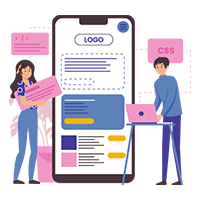We are Dynamic Responsive Disruptive Progressive
We are here to bring a Difference !

Some of our services
We Provide All Kinds of IT Services That Ensure Your Success
We are one of the fastest growing IT services companies in Noida, India. The key to making your business survive and thrive in this ever-evolving digital world is agility. From advice to support and solutions, we are here to take care of all your IT requirements. At Speedwell IT Solutions, we have a dedicated team comprising skilled and experienced professionals with profound business knowledge. Our team takes the time to listen to our client's requirements and tailor our services accordingly. We serve brands globally and help them expand their business, reach a broader audience and succeed.
We, at Speedwell IT Solutions Pvt. Ltd., plan, build and deliver smart solutions, breaking any sort of complexity through our expertise and years of experience. Make sure your business runs smoothly with our professional IT support services, customized as per your needs.
Looking for certified professionals to boost your business and website traffic? Contact Speedwell Today!
Contact to require a detailed analysis and assessment of your plan.





































































